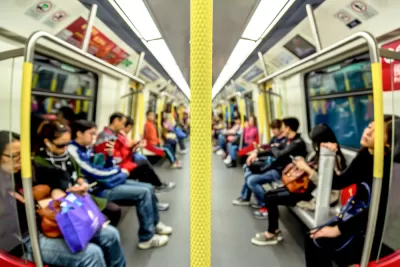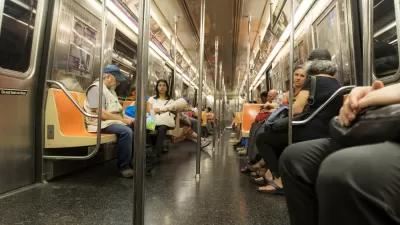Unsurprisingly, cities in Asia and Europe top the list.

A newly released list from the Oliver Wyman Forum and the University of California Berkeley’s Institute of Transportation Studies ranks transit systems in cities around the world, with Hong Kong coming in first thanks to its “low fares, limited delays or service disruptions, and for supporting itself financially.” Amelia Pollard details the list for Bloomberg CityLab.
One of the keys to Hong Kong’s success, says Andreas Nienhaus of Oliver Wyman, is the city’s willingness to make “individual mobility” less attractive to residents. “They have either large green zones or large car-free zones, or just make it very expensive to drive personal vehicles in the city. And this helps.” Other cities in the top of the list included Zurich, Stockholm, Singapore, and Helsinki. “The report also gives credit to Oslo’s multimodal network that includes park and ride stations, as well as allowing bikes on public transit.”
U.S. cities ranked low “because of their over dependence on cars,” according to Pollard. “Additionally, the report ranks cities on “mobility readiness,” with San Francisco topping the list in part for its EV-charging network. That said, Oliver Wyman points out concerns that San Francisco’s aging infrastructure puts it at risk in a region prone to natural disasters like earthquakes and wildfires.”
FULL STORY: These Cities Have the Best Public Transit Systems

Alabama: Trump Terminates Settlements for Black Communities Harmed By Raw Sewage
Trump deemed the landmark civil rights agreement “illegal DEI and environmental justice policy.”

Planetizen Federal Action Tracker
A weekly monitor of how Trump’s orders and actions are impacting planners and planning in America.

The 120 Year Old Tiny Home Villages That Sheltered San Francisco’s Earthquake Refugees
More than a century ago, San Francisco mobilized to house thousands of residents displaced by the 1906 earthquake. Could their strategy offer a model for the present?

In Both Crashes and Crime, Public Transportation is Far Safer than Driving
Contrary to popular assumptions, public transportation has far lower crash and crime rates than automobile travel. For safer communities, improve and encourage transit travel.

Report: Zoning Reforms Should Complement Nashville’s Ambitious Transit Plan
Without reform, restrictive zoning codes will limit the impact of the city’s planned transit expansion and could exclude some of the residents who depend on transit the most.

Judge Orders Release of Frozen IRA, IIJA Funding
The decision is a victory for environmental groups who charged that freezing funds for critical infrastructure and disaster response programs caused “real and irreparable harm” to communities.
Urban Design for Planners 1: Software Tools
This six-course series explores essential urban design concepts using open source software and equips planners with the tools they need to participate fully in the urban design process.
Planning for Universal Design
Learn the tools for implementing Universal Design in planning regulations.
Clanton & Associates, Inc.
Jessamine County Fiscal Court
Institute for Housing and Urban Development Studies (IHS)
City of Grandview
Harvard GSD Executive Education
Toledo-Lucas County Plan Commissions
Salt Lake City
NYU Wagner Graduate School of Public Service





























